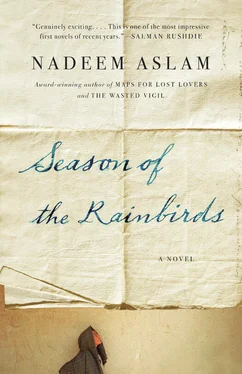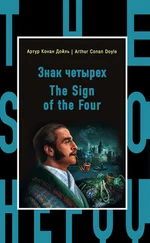Mr Kasmi was shaking his head. ‘It was …’ he struggled, ‘how many years ago?’
‘Nineteen. The gold leaf is still incredibly shiny though.’
Mr Kasmi closed the book.
‘Take it,’ the headmaster offered. ‘I don’t know what to do with them.’
Mr Kasmi unzipped his bag and placed the book inside. ‘Perhaps we should try to block the holes with them.’
His words were choked by the gust of foul smell that rose to meet him from below.

Azhar held the cigarette in his mouth, his lips curling around the yellow filter, and lowered his head to the flame. He inhaled the smoke deep into his body and letting the matchstick fall on to the marble floor stepped on it without looking down.
‘I still don’t know what to do about the post office,’ he said. ‘There’s no sign of the postmaster.’
Mujeeb Ali said, ‘It’ll be hard to find him now. What with this thing last night about the General. He won’t come out into the daylight for a long while yet.’
Azhar nodded. ‘I haven’t received the list yet but I’m sure his name will be near the top.’ The words were muffled by the thick blue smoke he exhaled. The smoke floated out of the open window, towards the twisting river.
‘They say it was the work of the secessionists from Baluchistan,’ Mujeeb Ali said companionably.
‘Secessionists? What secessionists?’ Azhar feigned surprise. ‘That region is at peace, remember. No civil war is raging in that region.’
A worn smile spread across Mujeeb Ali’s face.
‘Lahore is under curfew,’ Azhar said.
Mujeeb Ali said: ‘How is everything in Lahore? Sabina and the children?’
Azhar did not look up. ‘They are very well.’ And then he said: ‘I heard about your visit to Elizabeth.’
The dark skin under Mujeeb Ali’s eyes had tightened. ‘You cannot go on living this way. Either get rid of her or marry her. The current set-up is not right because people have found out.’
The younger man shut his eyes and nodded that he understood.
‘Why so much fuss over a chodhi? Get rid of her to stop people talking.’
Azhar nodded. ‘We’ll see.’

Benjamin Massih sat up. He had spent most of the previous two weeks lying in bed with a dislocated elbow and a broken shinbone. The masseur had aligned the broken bone and reengaged the joint. Schoolboys’ wooden rulers had been used as splints. A little dazed, he gently lowered his feet to the earthen floor. He stood up, and sat down almost immediately. He looked around the narrow low-ceilinged room. Two rope cots were set against the opposite wall. A large crucifix was hanging from a rusty nail driven deep into the mud wall, deep into the wooden frame of the house. A shelf, trimmed with zigzags of newspaper, held a framed religious print: the gold leaf was flaky and the scarlet had faded to a dull pink. Benjamin stood up again, more carefully, and through the open door of the room looked out at the courtyard edged with pots of herbs. He walked stiffly to the door and, once there, called: ‘Tereza.’
His wife came out of the kitchen and was alarmed at seeing him out of bed. ‘Get back on to the cot.’
Benjamin Massih had turned around and was dragging his left leg behind him like a lame animal. ‘I’m hungry,’ he said without turning around.
Tereza Massih was at his side. ‘You shouldn’t be moving your limbs yet.’ Around her neck she wore a silver chain on which hung a tiny Jesus Christ — arms outstretched, legs lightly bowed at the knees. There was no cross behind the figure — it was almost as though the wearer herself was the cross on to which the Messiah was nailed.
Benjamin Massih smiled. ‘I know you’re trying to starve me to death. I wouldn’t be surprised to find that you’ve sent for Father Emmanuel to give me Extreme Unction.’
Tereza Massih smiled. ‘You shouldn’t have got up.’ She helped Benjamin Massih back into bed, doubled the pillow and arranged it behind the invalid’s spine. ‘I’ll bring some soup.’ Her flaxen hair was gathered at the nape of the neck with a rag.
‘What is it?’ Benjamin Massih asked when she returned to the room bearing a clay bowl.
‘Trotters.’ The woman set the bowl on the floor and went back into the kitchen for a spoon and a low stool of unplaned wood.
‘Nothing tastes the way it used to once,’ Benjamin Massih lamented as his wife fed him the first spoonful. The room was full of mosquitoes. The small window admitted the noise of running water and the smell of dung.
Tereza Massih dipped the brass spoon in the bowl and inhaled the warm vapour that pirouetted delicately on the surface of the soup before rising up. ‘Age has mangled our taste-buds.’ She lifted the spoon to the open mouth.
But later — the soup half gone — Benjamin Massih smacked his lips. ‘Trotters make the tastiest soup.’
His wife nodded in agreement.
‘And sheep’s tail, too,’ he said, swallowing.
‘Do you remember what your father-ji, may he rest in peace, used to call a sheep’s tail?’
‘Arse lid,’ the man said promptly, and laughed, invigorated by the food.
The woman tried to contain her laughter. ‘Some people say you can make soup from chicken claws too.’
‘Yes,’ said Benjamin Massih. ‘I have tasted it. Very tasty with a day-old tandoori naan.’
She grimaced. The soup was finished; she tilted the bowl and coaxed the last murky mouthful into the spoon.
‘Some people eat brain and eyeballs. Rich people!’ Benjamin Massih swallowed the last, slightly too salty, mouthful. He was enjoying the distaste on his wife’s face.
She was standing up. ‘Stop right there, Benjamin Massih,’ she said through a smile; she was giving him a fake reproving look. ‘I know which part of the body you’re going to mention next.’ She picked up the stool — the Messiah swung back and forth between her chest and chin — and went to the door.
Benjamin Massih was laughing stridently now. ‘And, of course, people eat sheep’s testicles,’ he shouted after her. He heard her laugh in the small kitchen next door. He wiped his lips on his sleeve, unfolded the pillow and, still smiling hugely, lowered his head on to the pillow.
Some minutes later he heard her call out: ‘Stay where you are.’
He raised his head and caught a glimpse of her crossing the courtyard. Someone was at the door. Their door always stood open; a tattered hessian curtain was all that prevented sight of the courtyard from the street. He could hear the woman attending to the caller.
‘Are you Elizabeth Massih’s mother?’
‘Yes.’
Maulana Hafeez folded his umbrella. His face was chafed by the winds that had risen during the evening. He smiled politely: ‘I would like to talk to your husband.’
‘Who are you?’ Tereza Massih had pulled her stole over her hennaed hair.
‘Hadji Maulana Hafeez Bux Bukhari.’
The woman understood immediately. She looked around and, her fingers furiously gripping the edge of the door, invited Maulana Hafeez into the house.
She let down one of the cots and gestured Maulana Hafeez to sit. Then she helped Benjamin Massih to sit up.
Maulana Hafeez asked about the injuries. While her husband talked, Tereza Massih switched on the light bulb that hung from a hook in the centre of the ceiling. The light reached every corner of the room, like spilt sugar. Tereza Massih closed the window and lighted a mosquito-repellent coil. Despite her silence she seemed poised, alert.
‘It’s about your daughter Elizabeth,’ Maulana Hafeez said at last.
Читать дальше













